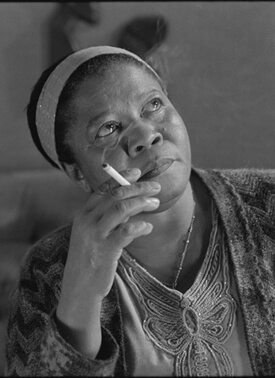Isabel Cardoso as Santa in Miguel Gomes’ “Tabu.” | ADOPT FILMS
When it makes the news, Portugal is mentioned mostly these days for its faltering economy. Yet it has one of the most thriving national cinemas in Europe, with extremely talented filmmakers like Pedro Costa, João Pedro Rodrigues, and the world’s oldest working director, Manoel de Oliveira.
You can add Miguel Gomes to that list. His previous film, the documentary-fiction hybrid “Our Beloved Month of August,” played briefly at Anthology Film Archives. “Tabu” has received far more attention, winning two awards at last winter’s Berlin Film Festival. While I’m slightly less enthusiastic about it than many of my fellow critics, it’s a hell of a calling card.
In present-day Portugal, Pilar (Teresa Madruga) enjoys her first years of retirement, remaining politically active and working with Catholic charities. She’s troubled, however, by her neighbor Aurora’s apparent loneliness. In her 80s, Aurora (Laura Soveral) heads to the casino, losing all her money whenever she has any cash to spare. She also constantly complains about her daughter and thinks her maid Santa (Isabel Cardoso) is casting voodoo spells to spite her. For her part, Santa minds her own business, reading “Robinson Crusoe” in her apartment at night.
On her deathbed, Aurora asks Pilar and Santa to track down a man named Gian Luca Ventura (Henrique Espírito Santo), who they discover is still alive but suffers from dementia. Ventura made a secret pact with Aurora in Africa 50 years earlier, just before Portugal lost its African colonies. The second half of the film switches to Africa and takes place in flashback, with narration by Ventura.
“Tabu” suggests that Gomes is familiar with a wide range of classic and current cinema. His appropriation from silent cinema is closer to Filipino director Raya Martin’s than “The Artist.” The separation of sound and image and the invocation of the last days of colonialism recall Marguerite Duras’ “India Song.” While he doesn’t use live dialogue in the film’s second half — we see the characters’ lips move but don’t hear what they’re saying — sound effects are employed. The film’s very title comes from German Expressionist master F.W. Murnau’s final film, set on a Polynesian island. Gomes fills “Tabu” with beautiful vistas of African landscapes, shot in black and white. The image is shrunk to an aspect ratio of 1.33, the same as old-fashioned TV sets and movie screens before the advent of Cinemascope.
There’s one scene in particular that sums up Gomes’ brand of weirdness. Ventura’s friend Mario’s band is performing a cover of Phil Spector’s “Baby, I Love You.” Close attention reveals that they’re actually lip-synching to the Ramones’ version of the song. The string section accompanying the Ramones is nowhere in sight. The singer sometimes holds his microphone away from his mouth while Joey Ramone is singing. The soundtrack is filled with Portuguese-language Spector covers. Gomes works with familiar material but treats in ways that make it new.
Alas, “Tabu” falls into a long line of films that use Africa as a backdrop for the problems of white people. This impression isn’t helped by the use of intertitles declaring Portugal a “lost paradise” and Africa a “paradise, ” although Gomes is obviously being ironic. To be fair, social realism is the last thing on Gomes’ mind. He’s obviously not trying to give a conventional account of the last days of Portuguese colonialism. In fact, the growing probability of African rebellion and the fact that his characters’ “paradise” comes with a sell-by date are only acknowledged in the film’s final ten minutes. But if he’s critiquing his characters’ obliviousness to the unhappiness of their African neighbors, it’s a mighty subtle enterprise.
“Tabu” is a fever dream of Africa, not a tract. Nevertheless, Gomes’ choice of subject matter can’t help being politically suggestive. It fits snugly with recent European films like Chantal Akerman’s “Almayer’s Folly” and Claire Denis’ “White Material,” which have explored the ongoing legacy of colonialism. “White Material” is unabashedly told from a white woman’s perspective, but it does more than give lip service to its black characters, suggesting that colonialism is a form of madness. By contrast, the only fully developed black character in “Tabu,” Santa, lives in present-day Portugal. Gomes’ film-buff playfulness and eye for beauty are welcome, but he’s not as distant from old colonial ghosts as he thinks he is.
TABU | Directed by Miguel Gomes | Adopt Films | In Portuguese with English subtitles | Opens Dec. 26 | Film Forum | 209 W. Houston St. | filmforum.org





































